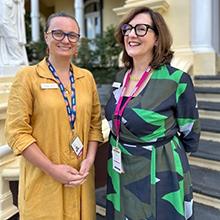22 March 2024

Uniting NSW.ACT and UNSW Sydney’s Centre for Healthy Brain Ageing (CHeBA) teamed up to co-author a research paper about the impact of person-centred intervention on the quality of healthcare and clinical outcomes for people living with dementia at Uniting’s War Memorial Hospital with successful results – winning praise, and publication, from the Journal of Alzheimer’s Disease.
The research paper, titled Improving Healthcare Quality and Clinical Outcomes for Persons with Dementia in the Sub-Acute Hospital Through Person-Centered Care Practice, concluded the person-centred care model significantly improved clinical outcomes for people living with dementia, after hospitilisation.
Co-author and Uniting War Memorial Hospital Allied Health and Integrated Care Manager, Genevieve Maiden, said the international recognition will go a long way towards promoting person-centred care as best practice in healthcare across multiple disciplines.
“This means our patients with dementia, and their carers are partners throughout their healthcare journey, improving patient outcomes and experience,” Genevieve said.
“To achieve this, healthcare staff need the training and tools so they have the capability, opportunity and motivation to embrace this model of care.”
The study involved 67 War Memorial Hospital in-patients living with dementia aged 60 years and over, their carers, dementia care clinicians and researchers.
For nine months, 90 sub-acute hospital nursing, allied health and medical staff participated in online or face-to-face person-centred education and were supported in delivering person-centred healthcare by senior nursing, allied health and medical staff champions.
Uniting War Memorial Clinical Psychologist Donna McCade said the approach is all about how we look at every individual to understand how we better treat them.
“The person-centred care model was designed to assist clinical staff in knowing how to meet the holistic healthcare needs of persons living with dementia, including who they are as people, their beliefs, values, culture, religion and everything else that matters to them,” said Donna.
The study, conducted over a 13-month period between March 2022 and April 2023, found the benefits and clinical results arising from providing education and supporting clinical staff in person-centred care practices were significant.
“We found that implementing the person-centred care model provided significantly improved clinical outcomes for people with dementia; outcomes which are beneficial for the person and their family/carer and represent an enormous cost benefit for health services,” Donna said.
“Seeing every person as an individual with individual needs and wants helped to understand how to provide them with their own favourable environments under which they could thrive and improve.”
67 study participants with dementia and 38 of their family carers reported that they were highly satisfied with the person-centred approach to their healthcare.
WMH in-patient “Sue” said the person-centred care approach at WMH had made a huge difference to her own struggles with her health. “You just can’t quantify the support, they go over and above and you never feel like you’re too much trouble or not important.”
The paper will be published in the March issue of the Journal of Alzheimer’s Disease.
Media contact
Richelle Pellegrini
Media & Public Affairs Manager
0468 633 798
rpellegrini@uniting.org
About Uniting | uniting.org
Uniting NSW.ACT is responsible for the social justice, community services and chaplaincy work of the Uniting Church in NSW and the ACT. We provide care and support for people through all ages and stages of life, with a focus on people experiencing disadvantage and vulnerability.
Our purpose is to inspire people, enliven communities and confront injustice. We value diversity and always welcome everyone exactly as they are.







